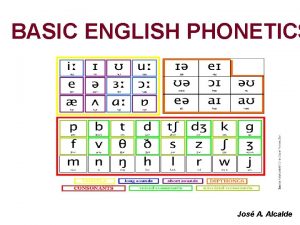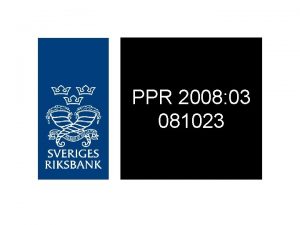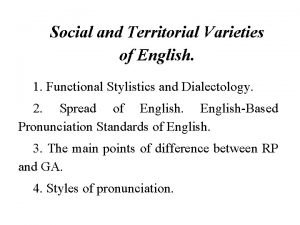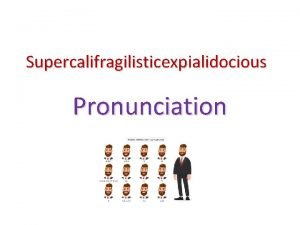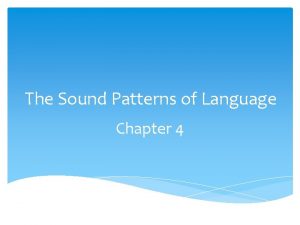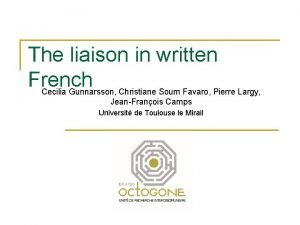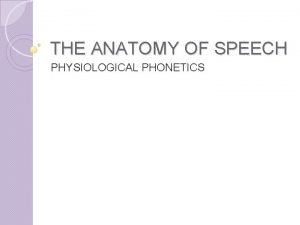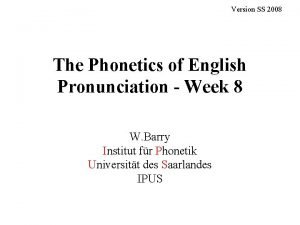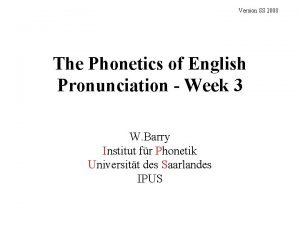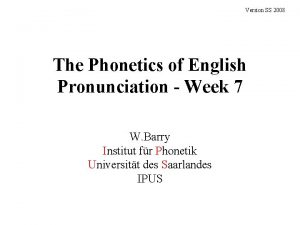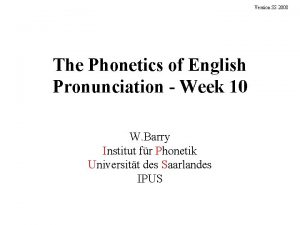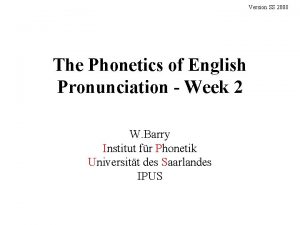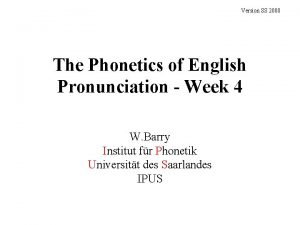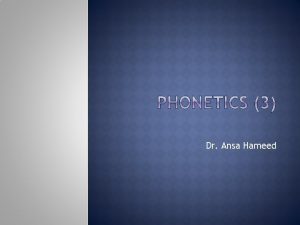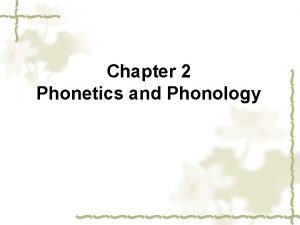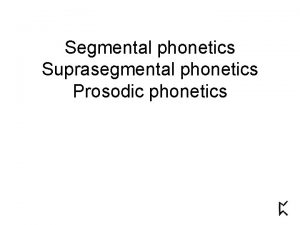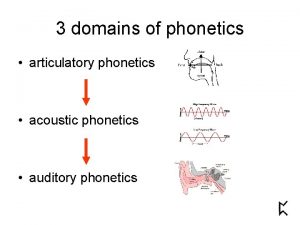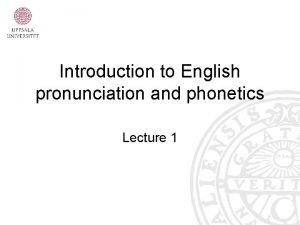Version SS 2008 The Phonetics of English Pronunciation



















- Slides: 19

Version SS 2008 The Phonetics of English Pronunciation 11 Word-Stress in compounds W. Barry Institut für Phonetik Universität des Saarlandes IPUS

Topics • Completion of Word-Stress survey Read again: Section VI. 2, pp. 188 -212 and Section VII. 2, pp. 239 -243 • Transcription exercise: “Elision, assimilation and stress” etc.

5 th Homework (1) Please transcribe with all weak forms, linking forms and segmental variants, and mark with the stressed syllable of the accented words (i. e. , the words that are „important“ for the message of the sentence): (US versions in blue) 1. There was no excuse for leaving the old lady standing in the 2. [D w z n U w Iks kju s li v. IN DI j Uld le. Idi st nd. IN In D D o. Uld 3. middle of the road, 4. m. Idl v D Ud] o. Ud

5 th Homework (2) 3. How could the group have avoided the frictions and [ ha. U k d D g u v v Id. Id D Ik. S nz n disagreements that led to their break-up? d. Is g i m nts z t led t De( ) b e. Ik ] De 4. They had no idea who the last person was who saw [De. I d n U w a. I d. I hu D l. A s(t) sn w z h. U s no. U l s(t) sn w. A z

5 th Homework (3) Transcribe and mark the primary ( stress in the following address names: Eton Place; ) and secondary ( Carnaby Street; Brighton Road; [ i tn le. Is] [ b aitn U(o. U)d] [ k. A (r)n bi st i t] Ridley Avenue; Pageant Court; Oxford Street; [ Idli j v nju ] [ (A )ks ( r)d st i t] k (r)t] Gordon Square; ) [ d. Zn t Smugglers Wharf;

Word-stress patterns so far • German compounds generally have the main stress on the left-most elements: Fröschen gasse. This is often also be the case in English, but there are some easily remembered word-classes that are different – i. e. , the main stress is on the right: Bayswater Road and Tottenham Court Road, • Generally: all ROAD NAMES belong to this category: xx Road: Bearwood Road, Euston Road xx Avenue: Cromptons Avenue, Ridley A xx Close, Pheasant Close, Bedwin Close One important exception: xx Street: Oxford Street, Regents Street, High Stre

Stress patterns: Named Buildings • Named buildings and monuments also have xx xx: Buckingham Palace, Albert Hall, National Gallery Westminster Abbey, Stone henge, Marble Arch Euston Station, Covent Garden And remember, with three element: xx xx xx Tottenham Court Road, Exception: xx-Mu seum: Science Mu seum, National History Mu seum, The Vic toria and Albert Mu seum

Stress patterns: Water! • Seas and Lakes etc. have xx xx: The North Sea (compare: Nord see) The English Channel ( Ärmelka nal) Loch Ness, Lake Michigan, Ni agara Falls • And compare: The At lantic Ocean The Pa cific Ocean but: The At lantic but: The Pa cific

Stress patterns: Adj+Noun • Adjective + Noun: Same in English and German: red hair rote Haare; blue sky blauer Himmel But Adj+Noun compounds are (unfortunately) variable: - Some contrast with the German xx xx pattern: short story vs. Kurzge schichte civil war vs. Bürger krieg - But many English Adj+Noun compounds are xx xx: black bird, blue print, • The first category is clearly problematical for short bread, dark room, German speakers. They just have to be learned! • And there are pitfalls (because German has exceptions too): E. g. , The White House vs. das Weiße Haus (not a compoun

Stress patterns: Other pitfalls! • Unfortunately, a number of English xx xx noun compounds have become German words …. and have changed to a non-German pattern! Engl. make- up Germ. Make-up / me k ? ap/ know- how Know-how / no h. AU/ come back Comeback / kam b. Ek/ check- in • But not Check-in all the loans necessarily change: / t. SEk ? In/ a work out stays as Workout / Similarly: the count down, pull over, v k ? AUt show down,

Stress patterns: Adj. +Past Participle • Compounds comprising an Adjective + Past participle: usually differ from German (in the way we have come to expect): over paid vs. überbe zahlt This is a very common form of adjectival compound: short- sighted, blue- blooded, thick- skinned long- haired, fine- tuned, thin- waisted, etc. • The same pattern applies, even if the word before the participle is not an adjective: Noun + PP: lily- livered, gold- plated, felt- tipped Adverb + PP: well-be haved, As always, an exception (Noun + PP): flood lit

Stress patterns: Stress shift! • Unfortunately!! Adjectives can be used both predicatively: He’s over paid and attributively: He’s an over paid e xecutive. The stress pattern has shifted! – to avoid having two stresses too close together. • This stress-shift takes place whenever a xx xx adjective is used attributively: lily- livered a lily- livered coward well-be haved a well- behaved child gold- plated a gold- plated watch felt- tipped a felt- tipped pen Not really a problem: A similar stress shift occurs in German: Das Konzert war gut be sucht Ein gut be suchtes Kon

Stress patterns: Phrasal verbs • Phrasal verbs have a xx xx pattern: He was tired but he kept on and didn‘t give up. There are great many phrasal verbs; here‘s a sample: cover up, point out, pull out, pile up, close down, shut up, shut down, pull down, turn over, • Some word sequences can operate as phrasal verbs or as verb + (unstressed) preposition: run + down: He ran the others down. = phr. vb. vs. He ran down the hill. = vb. + prep. turn + in: vs. The thief turned himself in. = ph Beethoven turned in his grave. = vb. + prep

Stress patterns: Adjectives from Phrasal verbs • Phrasal verbs: to wear out; to tire out: Adj: worn out; tired out "She was feeling worn out / tired out " (erschöpft) (But remember stress-shift!: "Her worn- out shoes") Other examples: to run down to feel run down (ausgelaugt) ; to chill out to be chilled out Some adjectives are similar but have no corresponding phrasal verb:

Stress patterns - Conclusions • Stress causes STRESS! • There are some regular sources of interference, which we have dealt with …… … and which you need to learn and remember. • There is no escaping the need to learn and, as with other aspects of pronunciation, to OVERLEARN the stress patterns of the words you learn. Otherwise, they will not be correct when you are busy thinking what to say (rather than how to say it!) • The stress-shift phenomena are probably not as bad as you think. The same thing happens in German.

Transcription exercise Pay special attention to possible assimilation and elision cases, and mark the stresses (main and secondary in the compounds). Last Sunday, Susan and Peter went to an old-fashioned garden-party in the gardens of the Town Hall. It was a disaster and nearly caused them to break up. The trouble was, Susan did not realise it was going to be old -fashioned. She expected something more hi-tec and trendy. After a show-down in the middle of the first speech – by Lady somebody-or-other – she walked out on him. Peter was totally fed-up, but I heard that they made up again later.

Transcription exercise (part 1) Last Sunday, Susan and Peter went to an old-fashioned su zn n wen(t) t. U n U i t [ l. A s s nde. I [ l s s nde. I su zn n wen(t) t. U n o i t garden-party in the gardens of the Town Hall. D ta. Un h l In D g. A dn z v g. A dn A ti g. A dn A t i In D g. A dn z v It was a disaster and nearly caused them to break up. t b e. Ik k zd D m It w z n n. I li d. I z. A st k zd D m It w z n n. I li d. I z st

Transcription exercise (part 2) The trouble was, Susan did not realise it was D su zn t bl w z w. A z d. Idn t I l going to be old-fashioned. g UIn t bi Uld Sn d go. UIn t bi o. Uld Sn d She expected something more hi-tec and trendy. s m. TIN m Si Ik s ekt. Id m ha. I tek

Transcription exercise (part 3) After a show-down in the middle of the first speech – m. Idl v s s i A t S U da. Un In D D s t So. U da. Un by Lady somebody-or-other – she walked out on him. ba. I D le. Idi s mb di Si w kt a. Ut s mb di D a. Ut An Peter was totally fed-up, but I heard that they b t a. I h d D t i t w z ed t Utl i b t a. I h d D i t w z to. U made up again later. me. Id gen le. It
 2008 2008
2008 2008 Basic english phonetics
Basic english phonetics Phonetic is
Phonetic is What is the song “si patokaan” all about
What is the song “si patokaan” all about Finn no english version
Finn no english version Ppr 2008 english
Ppr 2008 english Territorial varieties of english pronunciation
Territorial varieties of english pronunciation French alphabet phonetic pronunciation
French alphabet phonetic pronunciation Middle english pronunciation
Middle english pronunciation I take it you already know
I take it you already know El abecedario pronunciation
El abecedario pronunciation Power pronunciation in american english
Power pronunciation in american english Dentalized d
Dentalized d Scottish vowels
Scottish vowels Im easy lyrics
Im easy lyrics What is phonetics
What is phonetics Sound pattern of language
Sound pattern of language Gunnarsson fifa 19
Gunnarsson fifa 19 Phonetic anatomy
Phonetic anatomy Vowel sound phonetics
Vowel sound phonetics

